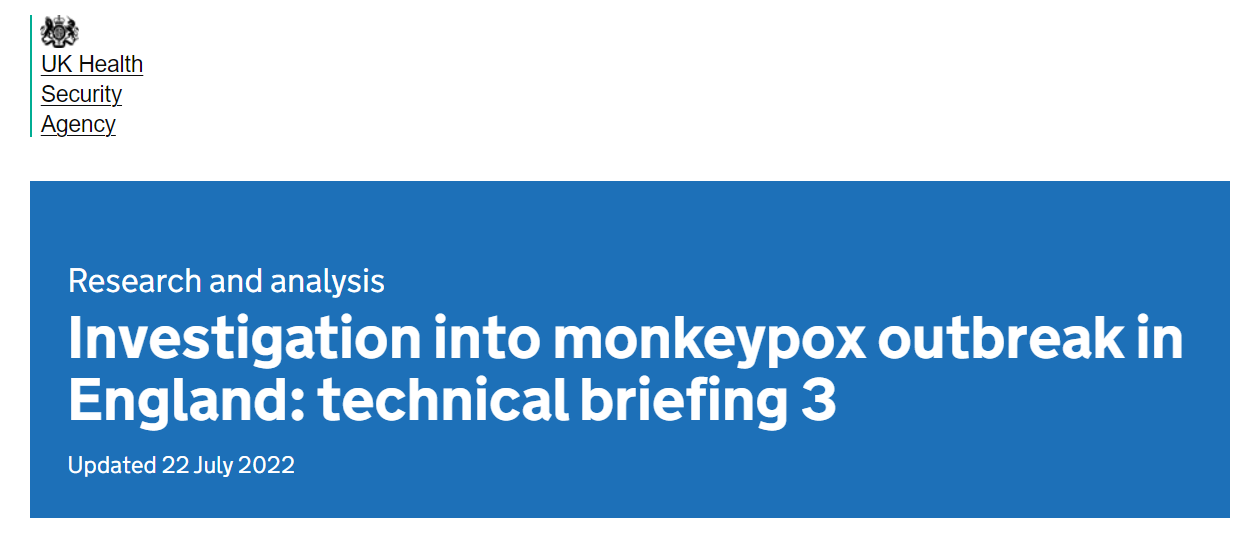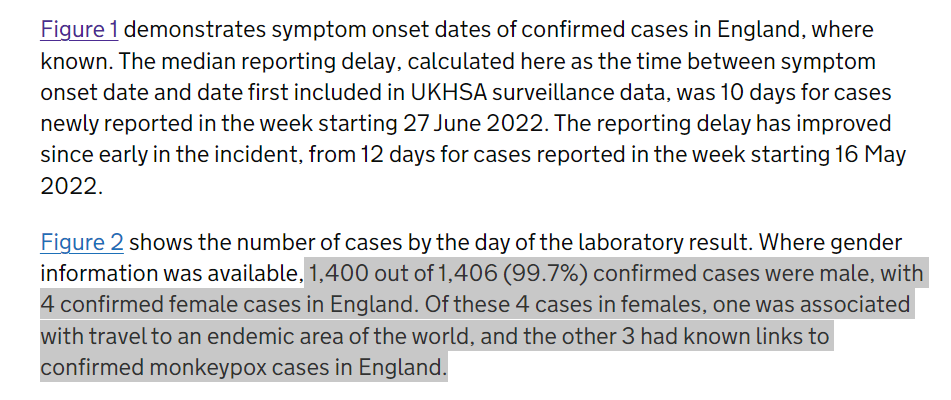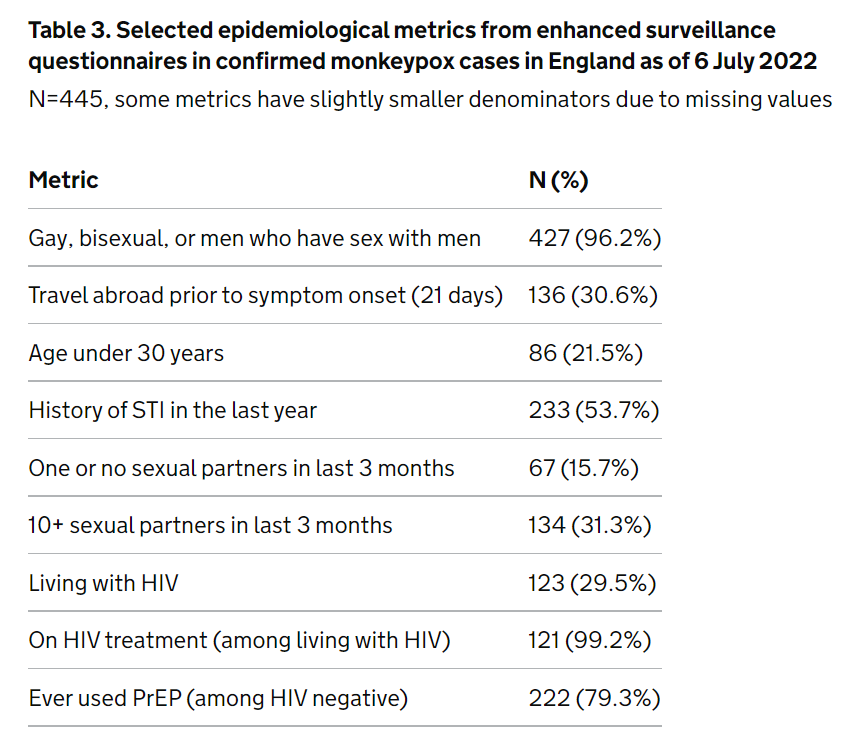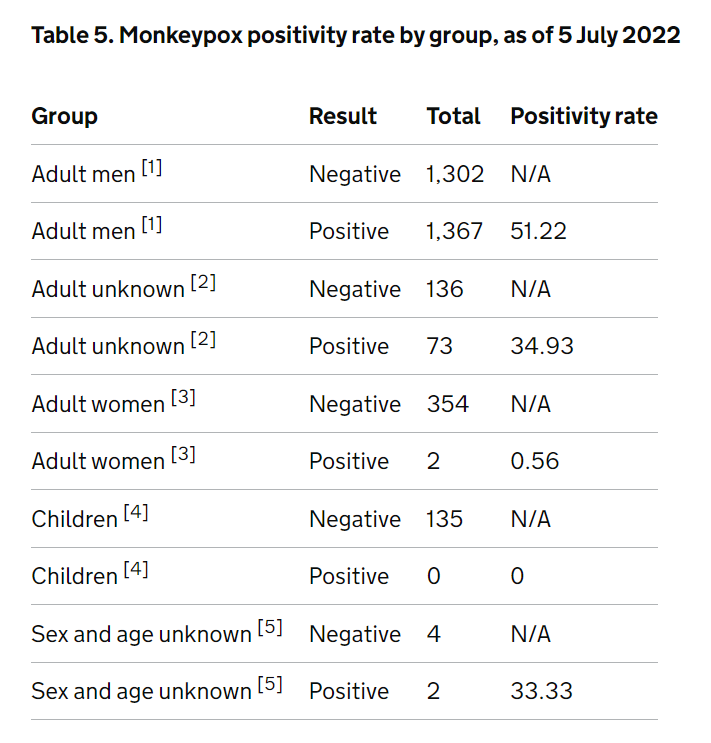Welcome to DU!
The truly grassroots left-of-center political community where regular people, not algorithms, drive the discussions and set the standards.
Join the community:
Create a free account
Support DU (and get rid of ads!):
Become a Star Member
Latest Breaking News
Editorials & Other Articles
General Discussion
The DU Lounge
All Forums
Issue Forums
Culture Forums
Alliance Forums
Region Forums
Support Forums
Help & Search
LGBT
Related: About this forumSaying monkeypox is tearing through communities of queer men isn't stigmatising - being afraid to sa
Saying monkeypox is tearing through communities of queer men isn’t stigmatising – being afraid to say it isNot since the gruesome heyday of HIV/Aids has a virus been such a threat to the lives of men who have sex with men. As monkeypox rips through queer communities, particularly in London, the cruel legacy of that pandemic casts an unnerving shadow. Conversations in LGBTQ+ spaces – from Highgate men’s pond in the capital to bars and clubs in urban centres – turn anxiously to this new threat.
hose who have had the virus share their experiences: some mild symptoms, others painful and miserable. WhatsApp groups ping with pictures of gay and bisexual men proudly displaying plaster-covered upper arms to confirm they’ve been vaccinated in a flashback to the peak of the national Covid trauma. On the gay hookup app Grindr, some use their profiles to announce they’re abstaining from sexual contact until their scheduled vaccination; in queer clubs, some choose to skip the ritual taking-off of T-shirts, fearing the prolonged skin-on-skin contact of an intimate dance will put them at risk.
This is, of course, quite unlike HIV, a virus that has taken the lives of tens of millions globally, and which ravaged gay and bi male communities in the west. We know what monkeypox is, the symptoms are largely mild for most, and an effective vaccine – developed for smallpox – is available in the UK. For a significant period in the 1980s, no one knew what was causing rare illnesses such as Kaposi’s sarcoma among men who have sex with men. Speculation was rife: could it be, for example, the high use of amyl nitrite (or “poppers”) by gay and bi men on club floors and in bedrooms? Larry Kramer’s The Normal Heart, a searing play about that early period, explored the panic as gay and bi men watched their friends suddenly stricken by devastating illnesses and suffering often unbearable deaths, unsure about the cause and whether or when it would be their turn.
The brutality of that time feeds into a collective trauma among queer men which, for some, has led to a defensiveness over monkeypox. The response to HIV dripped with stigma: already widespread public hostility to same-sex relations was stirred up by media outlets sensationalising a “gay plague”; “I’d shoot my son if he had Aids, says vicar!” was one Sun headline in 1985; while James Anderton, the chief constable of Greater Manchester police until 1991, denounced gays, drug addicts and sex workers with HIV for “swirling in a human cesspit of their own making”.
more...
3 replies
 = new reply since forum marked as read
Highlight:
NoneDon't highlight anything
5 newestHighlight 5 most recent replies
= new reply since forum marked as read
Highlight:
NoneDon't highlight anything
5 newestHighlight 5 most recent replies
Saying monkeypox is tearing through communities of queer men isn't stigmatising - being afraid to sa (Original Post)
Behind the Aegis
Jul 2022
OP
Higherarky
(637 posts)1. Thanx 4 sharing this article.
Every day is a school day, & I learn a lot at DU.
I read the comments section, and one thing that stands out to me is so many commenters dissing gay folk because the gays are "abomination" (paraphrasing here) to their xtian god.
These unfortunate people don't seem to understand that what they are doing is actually dissing their OWN "god." Because if the "god" they claim exists created gay folk, and they DO claim their god as the "creator", it would follow that their "god" created gay folk and loves them and is as proud of them as any other of "god's" creations.
Those poor, lost, blind people. It's difficult to feel sorry for them, but they truly are a "sorry" lot.
Celerity
(52,545 posts)2. Thank you so much for posting this. I have been saying the same thing.
U.S. Messaging on Monkeypox Is Deeply Flawed
Officials seem unwilling to be direct about who is most at risk of the disease. As monkeypox cases rise in the U.S., public officials are scrambling to balance concerns about stigmatization with the fact that the disease is largely affecting gay and bisexual men.
https://www.theatlantic.com/newsletters/archive/2022/07/us-messaging-on-monkeypox-is-deeply-flawed/670573/
https://archive.ph/7kKZc

Risk Assessment
In the parts of the world where monkeypox is newly spreading, like the United States and Europe, the people currently most at risk of getting the disease are gay and bisexual men. A recent update from the World Health Organization noted that cases in newly afflicted countries have mainly been among “men who have had recent sexual contact with a new or multiple male partners.” In Europe, just 0.2 percent of the men who have gotten the disease identify as heterosexual. Reports from the center of the U.S. outbreak—New York City—show that “the number of monkeypox cases has nearly tripled in the last week, nearly all of them among men who have sex with men.” The infectious-disease and LGBTQ-health journalist Benjamin Ryan notes that though the U.S. is, frustratingly, not collecting demographic details on monkeypox patients, Britain is, and the numbers there are clear: “Half of men screened for monkeypox tested positive; women, by contrast, tested positive only 0.6 percent of the time.”
And yet, despite this barrage of data, an American following the public-health messaging on monkeypox might come away with the idea that all populations are similarly at risk of contracting the disease. U.S. officials are taking action to specifically protect men who have sex with other men (MSM) from monkeypox—importantly, supplies of the vaccine have largely been reserved for that community. And yet, many public-health officials—and some media outlets—have scrambled to combat the idea that monkeypox is a “gay disease.” (Both the CDC and WHO websites bury mentions of MSM risk.) These authorities, Ryan has argued, have spread a message “so egregiously misleading it amounts to misinformation.” That message? Anyone can get monkeypox.
This is not the first time American public-health officials have pushed a confusing communications strategy about the transmissibility of a dangerous virus. Smithsonian magazine has documented how some AIDS organizations criticized the federal government for its “everyone is at risk” message in the late 1980s and early ’90s. These organizations “saw the campaign as diverting money and attention away from the communities that needed it the most” and instead focusing resources on much lower-risk populations. Yesterday, The New York Times reported on a battle within New York City’s health department. The story revealed a widespread discomfort within the agency with acknowledging and highlighting the primary route of monkeypox transmission: sex between men:
snip
Gay men deserve the unvarnished truth about monkeypox
https://www.washingtonpost.com/opinions/2022/07/18/monkeypox-gay-men-deserve-unvarnished-truth/
https://archive.ph/JQOcc

“Anyone can get monkeypox.” Countless public health experts have uttered statements such as this in the past two months. Members of the media and politicians have parroted the message ad nauseam without stopping to dissect what it implies or obscures. This broad-strokes maxim — that everyone on Earth is susceptible to this troubling viral infection — might be factual on its surface. But it is so egregiously misleading it amounts to misinformation.
Those who make such statements don’t intend harm. On the contrary, leaders at the Centers for Disease Control and Prevention, the World Health Organization and elsewhere repeat them because they commendably want to combat the societal stigma faced by gay and bisexual men, who have been disproportionately impacted by monkeypox. They know that stigma harms public health, including by discouraging infectious-disease testing. And they don’t want the rest of the public to be complacent in the face of a potential new pandemic.
But as these public health experts know well, epidemiology is less concerned with whether someone could contract an infection; instead, the much more vital questions focus on which groups of people are most likely to be exposed to a pathogen, to contract it and why. In public health statistics, this is the study of relative risk. By reducing monkeypox risk to a simplistic binary equation, public health leaders are prioritizing fighting stigma over their duty to directly inform the public about the true contours and drivers of this global outbreak. In particular, they are failing to properly convey the seriousness of this burgeoning crisis to gay and bisexual men.
Here is what we can discern from data collected about monkeypox so far: This viral outbreak isn’t just mostly occurring among men who have sex with men. The confirmed cases, at least to date, have consistently almost entirely occurred among this demographic, which accounts for 96 percent or more of diagnoses where data are available. Per capita, the few monkeypox cases in women and children remain minuscule compared with the rate among gay and bisexual men. Of course, substantial transmission could always occur among such other groups. But researchers at the WHO and elsewhere have speculated that the monkeypox reproduction rate will likely remain significantly lower in such demographics — meaning the virus will more likely hit transmission dead ends among them than among gay and bisexual men.
snip
Monkeypox primarily transmitted through sexual activity, says new study
A new study has shown 95% of monkeypox cases have been transmitted through sexual activity. US health officials are concerned that it could become an entrenched STD, like gonorrhea, herpes or HIV.
https://www.dw.com/en/monkeypox-primarily-transmitted-through-sexual-activity-says-new-study/a-62560540
New research published by the New England Journal of Medicine suggests that 95% percent of monkeypox cases have been transmitted through sexual activity. The research was led by scientists at Queen Mary University of London. It looked at 528 confirmed infections in 16 countries between April 27 and June 24, 2022.
According to the study, 98% of infected people were gay or bisexual men, and 41% had HIV. The median age was 38. Their median number of sex partners in the prior three months was five, and around a third were known to have visited sex-on-site venues such as sex parties or saunas within the previous month.
The study also showed monkeypox patients have been showing symptoms previously unrelated to the virus, such as single genital lesions and sores on the mouth or anus. Many of these are similar to symptoms of sexually transmitted diseases (STDs) and could lead to misdiagnosis, said researchers.
"It is important to stress that monkeypox is not a sexually transmitted infection in the traditional sense — it can be acquired through any kind of close physical contact. However, our work suggests that most transmissions so far have been related to sexual activity mainly, but not exclusively, among men who have sex with men," said first author John Thornhill, in a statement.
snip

Monkeypox Virus Infection in Humans across 16 Countries — April–June 2022
https://www.nejm.org/doi/full/10.1056/NEJMoa2207323

BACKGROUND
Before April 2022, monkeypox virus infection in humans was seldom reported outside African regions where it is endemic. Currently, cases are occurring worldwide. Transmission, risk factors, clinical presentation, and outcomes of infection are poorly defined.
METHODS
We formed an international collaborative group of clinicians who contributed to an international case series to describe the presentation, clinical course, and outcomes of polymerase-chain-reaction–confirmed monkeypox virus infections.
RESULTS
We report 528 infections diagnosed between April 27 and June 24, 2022, at 43 sites in 16 countries. Overall, 98% of the persons with infection were gay or bisexual men, 75% were White, and 41% had human immunodeficiency virus infection; the median age was 38 years. Transmission was suspected to have occurred through sexual activity in 95% of the persons with infection. In this case series, 95% of the persons presented with a rash (with 64% having having < 10 lesions), 73% had anogenital lesions, and 41% had mucosal lesions (with 54 having a single genital lesion). Common systemic features preceding the rash included fever (62%), lethargy (41%), myalgia (31%), and headache (27%); lymphadenopathy was also common (reported in 56%). Concomitant sexually transmitted infections were reported in 109 of 377 persons (29%) who were tested. Among the 23 persons with a clear exposure history, the median incubation period was 7 days (range, 3 to 20). Monkeypox virus DNA was detected in 29 of the 32 persons in whom seminal fluid was analyzed. Antiviral treatment was given to 5% of the persons overall, and 70 (13%) were hospitalized; the reasons for hospitalization were pain management, mostly for severe anorectal pain (21 persons); soft-tissue superinfection (18); pharyngitis limiting oral intake (5); eye lesions (2); acute kidney injury (2); myocarditis (2); and infection-control purposes (13). No deaths were reported.
CONCLUSIONS
In this case series, monkeypox manifested with a variety of dermatologic and systemic clinical findings. The simultaneous identification of cases outside areas where monkeypox has traditionally been endemic highlights the need for rapid identification and diagnosis of cases to contain further community spread.
snip

https://www.gov.uk/government/publications/monkeypox-outbreak-technical-briefings/investigation-into-monkeypox-outbreak-in-england-technical-briefing-3







Officials seem unwilling to be direct about who is most at risk of the disease. As monkeypox cases rise in the U.S., public officials are scrambling to balance concerns about stigmatization with the fact that the disease is largely affecting gay and bisexual men.
https://www.theatlantic.com/newsletters/archive/2022/07/us-messaging-on-monkeypox-is-deeply-flawed/670573/
https://archive.ph/7kKZc

Risk Assessment
In the parts of the world where monkeypox is newly spreading, like the United States and Europe, the people currently most at risk of getting the disease are gay and bisexual men. A recent update from the World Health Organization noted that cases in newly afflicted countries have mainly been among “men who have had recent sexual contact with a new or multiple male partners.” In Europe, just 0.2 percent of the men who have gotten the disease identify as heterosexual. Reports from the center of the U.S. outbreak—New York City—show that “the number of monkeypox cases has nearly tripled in the last week, nearly all of them among men who have sex with men.” The infectious-disease and LGBTQ-health journalist Benjamin Ryan notes that though the U.S. is, frustratingly, not collecting demographic details on monkeypox patients, Britain is, and the numbers there are clear: “Half of men screened for monkeypox tested positive; women, by contrast, tested positive only 0.6 percent of the time.”
And yet, despite this barrage of data, an American following the public-health messaging on monkeypox might come away with the idea that all populations are similarly at risk of contracting the disease. U.S. officials are taking action to specifically protect men who have sex with other men (MSM) from monkeypox—importantly, supplies of the vaccine have largely been reserved for that community. And yet, many public-health officials—and some media outlets—have scrambled to combat the idea that monkeypox is a “gay disease.” (Both the CDC and WHO websites bury mentions of MSM risk.) These authorities, Ryan has argued, have spread a message “so egregiously misleading it amounts to misinformation.” That message? Anyone can get monkeypox.
This is not the first time American public-health officials have pushed a confusing communications strategy about the transmissibility of a dangerous virus. Smithsonian magazine has documented how some AIDS organizations criticized the federal government for its “everyone is at risk” message in the late 1980s and early ’90s. These organizations “saw the campaign as diverting money and attention away from the communities that needed it the most” and instead focusing resources on much lower-risk populations. Yesterday, The New York Times reported on a battle within New York City’s health department. The story revealed a widespread discomfort within the agency with acknowledging and highlighting the primary route of monkeypox transmission: sex between men:
The Health Department’s guidance to the public has often highlighted nonsexual routes of potential transmission, such as hugging or contact with bedding. While those are certainly possible routes of transmission, the result — Dr. Weiss [a doctor at the department] said — was to make people overly concerned about casual physical contact and not sufficiently aware that most monkeypox infections in New York appeared to be transmitted through sex.
snip
Gay men deserve the unvarnished truth about monkeypox
https://www.washingtonpost.com/opinions/2022/07/18/monkeypox-gay-men-deserve-unvarnished-truth/
https://archive.ph/JQOcc

“Anyone can get monkeypox.” Countless public health experts have uttered statements such as this in the past two months. Members of the media and politicians have parroted the message ad nauseam without stopping to dissect what it implies or obscures. This broad-strokes maxim — that everyone on Earth is susceptible to this troubling viral infection — might be factual on its surface. But it is so egregiously misleading it amounts to misinformation.
Those who make such statements don’t intend harm. On the contrary, leaders at the Centers for Disease Control and Prevention, the World Health Organization and elsewhere repeat them because they commendably want to combat the societal stigma faced by gay and bisexual men, who have been disproportionately impacted by monkeypox. They know that stigma harms public health, including by discouraging infectious-disease testing. And they don’t want the rest of the public to be complacent in the face of a potential new pandemic.
But as these public health experts know well, epidemiology is less concerned with whether someone could contract an infection; instead, the much more vital questions focus on which groups of people are most likely to be exposed to a pathogen, to contract it and why. In public health statistics, this is the study of relative risk. By reducing monkeypox risk to a simplistic binary equation, public health leaders are prioritizing fighting stigma over their duty to directly inform the public about the true contours and drivers of this global outbreak. In particular, they are failing to properly convey the seriousness of this burgeoning crisis to gay and bisexual men.
Here is what we can discern from data collected about monkeypox so far: This viral outbreak isn’t just mostly occurring among men who have sex with men. The confirmed cases, at least to date, have consistently almost entirely occurred among this demographic, which accounts for 96 percent or more of diagnoses where data are available. Per capita, the few monkeypox cases in women and children remain minuscule compared with the rate among gay and bisexual men. Of course, substantial transmission could always occur among such other groups. But researchers at the WHO and elsewhere have speculated that the monkeypox reproduction rate will likely remain significantly lower in such demographics — meaning the virus will more likely hit transmission dead ends among them than among gay and bisexual men.
snip
Monkeypox primarily transmitted through sexual activity, says new study
A new study has shown 95% of monkeypox cases have been transmitted through sexual activity. US health officials are concerned that it could become an entrenched STD, like gonorrhea, herpes or HIV.
https://www.dw.com/en/monkeypox-primarily-transmitted-through-sexual-activity-says-new-study/a-62560540
New research published by the New England Journal of Medicine suggests that 95% percent of monkeypox cases have been transmitted through sexual activity. The research was led by scientists at Queen Mary University of London. It looked at 528 confirmed infections in 16 countries between April 27 and June 24, 2022.
According to the study, 98% of infected people were gay or bisexual men, and 41% had HIV. The median age was 38. Their median number of sex partners in the prior three months was five, and around a third were known to have visited sex-on-site venues such as sex parties or saunas within the previous month.
The study also showed monkeypox patients have been showing symptoms previously unrelated to the virus, such as single genital lesions and sores on the mouth or anus. Many of these are similar to symptoms of sexually transmitted diseases (STDs) and could lead to misdiagnosis, said researchers.
"It is important to stress that monkeypox is not a sexually transmitted infection in the traditional sense — it can be acquired through any kind of close physical contact. However, our work suggests that most transmissions so far have been related to sexual activity mainly, but not exclusively, among men who have sex with men," said first author John Thornhill, in a statement.
snip

Monkeypox Virus Infection in Humans across 16 Countries — April–June 2022
https://www.nejm.org/doi/full/10.1056/NEJMoa2207323

BACKGROUND
Before April 2022, monkeypox virus infection in humans was seldom reported outside African regions where it is endemic. Currently, cases are occurring worldwide. Transmission, risk factors, clinical presentation, and outcomes of infection are poorly defined.
METHODS
We formed an international collaborative group of clinicians who contributed to an international case series to describe the presentation, clinical course, and outcomes of polymerase-chain-reaction–confirmed monkeypox virus infections.
RESULTS
We report 528 infections diagnosed between April 27 and June 24, 2022, at 43 sites in 16 countries. Overall, 98% of the persons with infection were gay or bisexual men, 75% were White, and 41% had human immunodeficiency virus infection; the median age was 38 years. Transmission was suspected to have occurred through sexual activity in 95% of the persons with infection. In this case series, 95% of the persons presented with a rash (with 64% having having < 10 lesions), 73% had anogenital lesions, and 41% had mucosal lesions (with 54 having a single genital lesion). Common systemic features preceding the rash included fever (62%), lethargy (41%), myalgia (31%), and headache (27%); lymphadenopathy was also common (reported in 56%). Concomitant sexually transmitted infections were reported in 109 of 377 persons (29%) who were tested. Among the 23 persons with a clear exposure history, the median incubation period was 7 days (range, 3 to 20). Monkeypox virus DNA was detected in 29 of the 32 persons in whom seminal fluid was analyzed. Antiviral treatment was given to 5% of the persons overall, and 70 (13%) were hospitalized; the reasons for hospitalization were pain management, mostly for severe anorectal pain (21 persons); soft-tissue superinfection (18); pharyngitis limiting oral intake (5); eye lesions (2); acute kidney injury (2); myocarditis (2); and infection-control purposes (13). No deaths were reported.
CONCLUSIONS
In this case series, monkeypox manifested with a variety of dermatologic and systemic clinical findings. The simultaneous identification of cases outside areas where monkeypox has traditionally been endemic highlights the need for rapid identification and diagnosis of cases to contain further community spread.
snip

https://www.gov.uk/government/publications/monkeypox-outbreak-technical-briefings/investigation-into-monkeypox-outbreak-in-england-technical-briefing-3







Pete Ross Junior
(404 posts)3. Bravo!
A counter to the head in the sand approach.